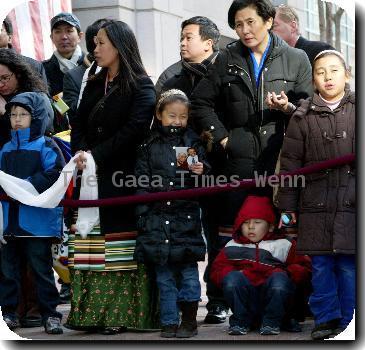Obama: ‘History’s cruel irony’ pushes up risk of nuclear attack, this time from terrorists
By Robert Burns, APTuesday, April 13, 2010
Obama: Risks of nuclear terrorism have risen
WASHINGTON — Citing a new nuclear reality, President Barack Obama urged world leaders Tuesday to reach beyond traditional means of avoiding nuclear conflict and agree on new measures to stop terrorists from getting their hands on atomic arms.
Addressing a 47-nation nuclear conference, Obama framed the problem as a “cruel irony of history” — nuclear dangers on the rise, even after the end of the Cold War and decades of fear stoked by a U.S.-Soviet arms race. A terrorist group in possession of plutonium no bigger than an apple could detonate a device capable of inflicting hundreds of thousands of casualties, he said.
“Terrorist networks such as al-Qaida have tried to acquire the material for a nuclear weapon, and if they ever succeeded, they would surely use it,” he told the opening session, which convened under tight security at the Washington Convention Center. “Were they to do so, it would be a catastrophe for the world, causing extraordinary loss of life and striking a major blow to global peace and stability.”
Lurking in the background at the nuclear security summit was a problem some see as equally worrisome: Iran’s alleged pursuit of a nuclear weapon. Iran, which was not invited to the conference, denies it intends to build an atomic bomb, and despite widespread concern about Iranian intentions, Obama is having difficulty getting agreement on a new set of U.N. sanctions against the country.
Obama organized the nuclear summit to win agreement on a plan for securing all vulnerable nuclear materials worldwide within four years. The summiteers were expected to announce how they think that can be done, with plans to review progress at a follow-up conference in South Korea in 2012.
President Lee Myung-bak told reporters that North Korean leader Kim Jong Il will not get an invitation until the North gives up its efforts to build a nuclear arsenal.
North Korea’s efforts — and its withdrawal from the Nuclear Non-Proliferation Treaty that sets the rules of the road for nuclear technology — kept it out of the Washington summit. Syria, which is suspected by the U.S. and others of harboring nuclear weapons ambitions, also was not invited.
As an example of the collective action called for by Obama, officials of the U.S., Canada and Mexico announced an agreement to work together, along with the U.N.’s nuclear watchdog agency, to convert the fuel in Mexico’s research reactor from highly enriched uranium to a lower-enriched fuel that would be much harder to use in the manufacturing of a nuclear weapon.
Mexico further agreed that once the fuel is converted, it will get rid of all its highly enriched uranium. That follows Ukraine’s announcement on Monday that it, too, will ship all its highly enriched uranium to protected storage outside its borders — possibly to Russia or the U.S.
U.S. officials touted their completion of a long-delayed agreement with Russia on disposing of tons of plutonium from Cold War-era weapons. Each country will complete and operate facilities to dispose of at least 34 tons of plutonium by using it as fuel in civilian power reactors to produce electricity, although it will not start until 2018; monitors and inspectors will ensure against cheating.
The State Department said the combined 68 tons of U.S. and Russian plutonium represents enough for about 17,000 nuclear weapons. The deal was signed Tuesday at the summit by Secretary of State Hillary Rodham Clinton and Russian Foreign Minister Sergey Lavrov.
British Foreign Secretary David Miliband, in his remarks to the conference, stressed the importance of protecting nuclear-related information.
“We must keep the science as well as the substance of nuclear materials out of terrorist hands,” he said, according to a transcript provided by British officials.
Signaling a growing commitment in Europe to addressing the dangers of nuclear proliferation and potential nuclear conflict, a group of 40 former European politicians and military officers issued a statement endorsing the goal of the Washington conference.
They also said nuclear dangers cannot be contained by addressing the terrorist threat alone. The nuclear powers need to disarm faster, they said, and countries that have not yet signed the Comprehensive Test Ban Treaty — including the United States — must do so.
“This is not just a concern for those fearing a nuclear terrorist attack,” the Europeans’ statement said. “Any major nuclear security incident anywhere is likely to derail the civil nuclear renaissance everywhere.”
There were few signs of dissent among the summit participants.
On the sidelines of the conference, German Chancellor Angela Merkel said she was “very content with the progress” in the talks. “This is a first, important step to react to new, so far unknown threats,” Merkel said, according to the German news agency DAPD.
In advance of the summit, experts cautioned against the leaders merely endorsing existing international agreements and not taking new initiatives.
Kenneth N. Luongo, president of the Partnership for Global Security, worried that the conference — the first of its kind — might prove to be long on hype and short on action, given what he called entrenched bureaucratic and technocratic interests and differing views on the urgency of the threat of nuclear terrorism.
“Allowing the nuclear summit to become an opportunity just to endorse and modestly strengthen the status quo would be extremely disappointing and potentially very dangerous,” he wrote in advance of the conference.
(This version CORRECTS the combined amount of plutonium to be converted is 68 tons, not 34)
Tags: Asia, Barack Obama, Central America, East Asia, Eastern Europe, Energy, Europe, Germany, International Agreements, Latin America And Caribbean, Lee Myung-bak, Mexico, North America, North Korea, Nuclear Weapons, Political Issues, Russia, Terrorism, United States, Utilities, Washington, Weapons Administration, Weapons Of Mass Destruction, Western Europe




